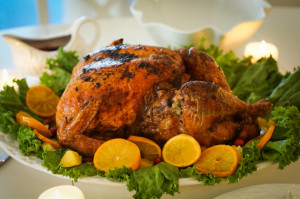- Calls to this hotline are currently being directed to Within Health, Fay or Eating Disorder Solutions
- Representatives are standing by 24/7 to help answer your questions
- All calls are confidential and HIPAA compliant
- There is no obligation or cost to call
- Eating Disorder Hope does not receive any commissions or fees dependent upon which provider you select
- Additional treatment providers are located on our directory or samhsa.gov
How to Deal with Anxiety and an Eating Disorder during the Holidays
Contributed by: Meghan Tomasek LPC, DBT Program Coordinator, Timberline Knolls
 Holidays for many of us are a time of celebration, loved ones and joy. For an individual struggling with an eating disorder this season may actually be a time of intense anxiety, as well as struggles with healthy and intentional eating.
Holidays for many of us are a time of celebration, loved ones and joy. For an individual struggling with an eating disorder this season may actually be a time of intense anxiety, as well as struggles with healthy and intentional eating.
For many, holiday celebrations are paired with special meals and a multitude of treats from pumpkin pie to candy canes. It makes sense to anticipate that this can prompt anxiety and worry thoughts.
Meals and treats are not the only stressors we find during the holidays, family expectations and customs can add additional anxiety to the season.
Due to its extreme prevalence, the holidays may be particularly difficult for those with binge eating disorder (BED). It is important to know that:
- Binge Eating Disorder is the most common eating disorder among US adults and more than two times as prevalent as bulimia nervosa and anorexia nervosa combined [1].
- BED is estimated to affect 1-5% of the general population [2].
- BED affects 3.5% of women, 2% of men, and up to 1.6% of adolescents [2].
Those with BED engage in behaviors such as eating much more rapidly than normal, eating until feeling uncomfortably full and or eating large amounts of food when not feeling physically hungry to cope with emotional pain. BED differs from bulimia in that the food consumption is not followed by compensatory behaviors such as vomiting or excessive exercise.
Dialectical Behavior Therapy
The principles of Dialectical Behavior Therapy (DBT) can offer many different skills to help support individuals struggling with BED or any type of eating disorder throughout the holidays. Two principles in particular, are helpful. Distress Tolerance is a skill designed to help people learn how to make it through crisis situations without making matters worse by engaging in unhealthy or ineffective behaviors.
 Emotion Regulation helps people learn how to tolerate and regulate their emotions in productive ways. Both of these tools can help manage anxiety and cope with eating disorder urges and thoughts.
Emotion Regulation helps people learn how to tolerate and regulate their emotions in productive ways. Both of these tools can help manage anxiety and cope with eating disorder urges and thoughts.
Emotion regulation skills can be practiced ahead of time to prepare for the stressors that may occur and how an individual might mindfully choose how she will handle this stressor if and when it arrives.
For example a young woman who struggles with binging urges may spend some time before thanksgiving preparing for the comments that her loved ones might make during dinner.
She would approach this by addressing it as such: “Since my loved ones always says things like ‘Are you really going to have another serving?’ or ‘You have to be careful how much you eat, or you are going to get fat’ or even ‘that’s okay, you can always start your diet tomorrow,’ I must be prepared.”
Anxieties
Knowing that these thoughts alone trigger intense anxiety for her she can then plan what distress tolerance techniques she will use in the actual moment. If someone says something about a second helping she can plan to pair that comment with the IMPROVE skill and say a prayer, or invite in words of encouragement.
 Leading up to Thanksgiving dinner, she can practice this skill so it can become familiar if this stressor arrives. She may practice this herself or with in her support system.
Leading up to Thanksgiving dinner, she can practice this skill so it can become familiar if this stressor arrives. She may practice this herself or with in her support system.
One of the great things about the holiday season is that everyone knows it is coming; it doesn’t catch anyone unawares. Therefore, by utilizing the skills of emotion regulation and distress tolerance, anyone can prepare in advance. But perhaps the most important principle of DBT is mindfulness.
This refers to learning to control your mind so it does not control you. Much of mindfulness is the ability to focus on the “now,” the present. Therefore, on the actual day in question, be it Thanksgiving or a Christmas dinner, intentionally concentrating on the right now is incredibly important.
Live in the moment, focus on the people you love, despite their flaws, enjoy the food without judgment on it or yourself. This day will come and go as it does every year.
Community Discussion:
Do you have times of the year or events that are particularly challenging for you in your recovery? What tools do you use to pivot the negative comments and relieve any mounting tension?
References:
1. American Psychiatric Association. Binge-eating disorder. In: Diagnostic and Statistical Manual of Mental Disorders. 5th ed. Arlington, VA: American Psychiatric Association; 2013:350-353.
2. NEDA cited: Hudson, J.I., Hiripi, E., Pope, H.G. et al. (2007)The prevalence and correlates of eating disorders in the National Comorbidity Survey Replication. Biol.Psychiatry, 61, 348–358.
 Meghan Tomasek LPC, DBT Program Coordinator
Meghan Tomasek LPC, DBT Program Coordinator
The opinions and views of our guest contributors are shared to provide a broad perspective of eating disorders. These are not necessarily the views of Eating Disorder Hope, but an effort to offer discussion of various issues by different concerned individuals.
We at Eating Disorder Hope understand that eating disorders result from a combination of environmental and genetic factors. If you or a loved one are suffering from an eating disorder, please know that there is hope for you, and seek immediate professional help.
Last Updated & Reviewed By: Jacquelyn Ekern, MS, LPC on November 5, 2015
Published on EatingDisorderHope.com

